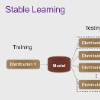Goal-conditioned hierarchical reinforcement learning (GCHRL) decomposes long-horizon tasks into sub-tasks through a hierarchical framework and it has demonstrated promising results across a variety of domains. However, the high-level policy's action space is often excessively large, presenting a significant challenge to effective exploration and resulting in potentially inefficient training. Moreover, the dynamic variability of the low-level policy introduces non-stationarity to the high-level state transition function, significantly impeding the learning of the high-level policy. In this paper, we design a measure of prospect for subgoals by planning in the goal space based on the goal-conditioned value function. Building upon the measure of prospect, we propose a landmark-guided exploration strategy by integrating the measures of prospect and novelty which aims to guide the agent to explore efficiently and improve sample efficiency. To address the non-stationarity arising from the dynamic changes of the low-level policy, we apply a state-specific regularization to the learning of low-level policy, which facilitates stable learning of the hierarchical policy. The experimental results demonstrate that our proposed exploration strategy significantly outperforms the baseline methods across multiple tasks.
翻译:暂无翻译



